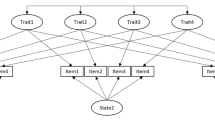Abstract
Eighty three people in the slums of Calcutta,India were interviewed, and responded toseveral measures of subjective well-being. Therespondents came from one of three groups:Those living in slum housing, sex workers(prostitutes) residing in brothels, andhomeless individuals living on the streets.They responded to questions about lifesatisfaction and satisfaction with various lifedomains, as well as to a memory recall measureof good and bad events in their lives. Whilethe mean rating of general life satisfactionwas slightly negative, the mean ratings ofsatisfaction with specific domains werepositive. The conclusion is that the slumdwellers of Calcutta generally experience alower sense of life satisfaction than moreaffluent comparison groups, but are moresatisfied than one might expect. This could bedue, in part, to the strong emphasis on socialrelationships and the satisfaction derived fromthem.
Similar content being viewed by others
REFERENCES
Balatsky, G. and E. Diener: 1993, ‘Subjective well-being among Russian students’ Social Indicators Research 28, pp. 225-243.
Banerjee, M.M.: 1997, ‘Strengths in a Slum: A paradox?’ Journal of Applied Social Sciences 22, pp. 45-58.
Christopher, J.C.: 1999, ‘Situating psychological well-being: Exploring the cultural roots of its theory and research’ Journal of Counseling and Development 77, pp. 141-152.
Diener, E. and R. Biswas-Diener: 2000, Income and subjective well-being: Will money make us happy? Manuscript submitted submitted for publication (University of Illinois).
Diener, E. and C. Diener: 1996, ‘Most people are happy’ Psychological Science 7, pp. 181-185.
Diener, E. and C. Diener: 1995, ‘The Wealth of nations revisited: Income and quality of life’ Social Indicators Research 36, pp. 275-286.
Diener, E., M. Diener and C. Diener: 1995, ‘Factors predicting the subjective well-being of nations’ Journal of Personality and Social Psychology 69, pp. 851-864.
Diener, E., R.A. Emmons, R.J. Larsen and S. Griffin: 1985, ‘The SatisfactionWith Life Scale’ Journal of Personality Assessment 49, pp. 71-75.
Diener, E. and R.E. Lucas: 2000, ‘Explaining differences in societal levels of happiness: Relative standards, need fulfillment, culture, and evaluation theory’ Journal of Happiness Studies: An Interdisciplinary Periodical on Subjective Well-Being 1, pp. 41-78
Diener, E., C.K. Napa-Scollon, S. Oishi, V. Dzokoto and E.M. Suh: 2000, ‘Positivity and the construction of life satisfaction judgments: Global happiness is not the sum of its parts’ Journal of Happiness Studies.
Diener, E. and S. Oishi: 2000, ‘Money and happiness: Income and subjective wellbeing across nations’ in E. Diener and E.M. Suh (eds.), Subjective well-being across cultures (MIT Press, Cambridge,MA).
Diener, E., E. Sandvik, L. Seidlitz and M. Diener: 1993, ‘The relationship between income and subjective well-being: Relative or absolute?’ Social Indicators Research 28, pp. 195-223.
Diener, E., E.M. Suh, R.E. Lucas and H.E. Smith: 1999, ‘Subjective well-being: Three decades of progress’ Psychological Bulletin 125, pp. 276-302.
Edgerton, R.B.: 1992, Sick societies: Challenging the myth of primitive harmony (The Free press, New York).
Jana, S.: 1999, Namaskar (Canvas Advertising Agency, Calcutta).
Lane, R.E.: 1991, The market experience (Cambridge University Press, Cambridge, UK).
LaPierre, D.: 1985, The city of joy (Doubleday & Company, Inc., Garden City, New York).
Loewenstein, G. and S. Frederick: 1999, ‘Hedonic adaptation: From the bright side to the dark side’ in D. Kahneman, E. Diener and N. Schwarz (eds.), Understanding quality of life: Scientific perspectives on enjoyment and suffering (Russell-Sage, New York).
Maslow, A.H.: 1954, Motivation and personality (Harper & Row, New York).
Menon, U. and R.A. Schweder: 1998, ‘The return of the ‘White man's burden’ The moral discourse of anthropology and the domestic life of Hindu women’ in R.A. Schweder (ed.), Welcome to middle age! (and other cultural fictions) (The University of Chicago Press, Chicago), pp. 139-187.
Michalos, A.C.: 1991, Global report on student well-being (Springer-Verlag, New York).
OFFER: 1998-1999, A reading between the lines (Teamwork, Calcutta, India).
Oswald, A.J.: 1997, ‘Happiness and economic performance’ The Economic Journal 107, pp. 1815-1831.
Pavot, W. and Diener: 1993, ‘Review of the Satisfaction with Life Scale’ Personality Assessment 5, pp. 164-172.
Salovey, P., A.J. Rothman, J.B. Detweiler and W.T. Steward: 2000, ‘Emotional states and physical health’ American Psychologist 55, pp. 110-121.
Sandvik, E., E. Diener and L. Seidlitz: 1993, ‘Subjective well-being: The convergence and stability of self-report and non-self-report measures’ Journal of Personality 61, pp. 317-342.
Schkade, D.A. and D. Kahneman: 1997, Would you be happier in California: A focusing illusion in judgments of well-being. Working paper (Princeton University).
Schwarz, N. and F. Strack: 1999, ‘Reports of subjective well-being: Judgemental processes and their methodological implications’ in D. Kahneman, E. Diener and N. Schwarz (eds.), Well-being: The foundations of hedonic psychology (Russell Sage Foundation, New York), pp. 61-84.
Silver, R.L.: 1982, Coping with an undesirable life event: A study of early reactions to physical disability (Doctoral dissertation, Northwestern University, Evanston, Illinois).
Stroebe, W., M. Stroebe, G. Abakoumkin and H. Schut: 1996, ‘The role of loneliness and social support in adjustment to loss: A test of attachment versus stress theory’ Journal of Personality and Social Psychology 70, pp. 1241-1249.
Thomas, F.C.: 1999, Calcutta: The human face of poverty (Penguin Books, Calcutta, India).
Veenhoven, R.: 1993, Happiness in nations: Subjective appreciation of life in 56 nations (Rotterdam: Risbo), pp. 1946-1992.
Veenhoven, R.: 1991, ‘Is happiness relative?’ Social Indicators Research 24, pp. 1-34.
Wilkeson, R.G.: 1996, Unhealthy societies: The afflictions of inequality (Routledge, London).
Author information
Authors and Affiliations
Rights and permissions
About this article
Cite this article
Biswas-Diener, R., Diener, E. Making the Best of a Bad Situation: Satisfaction in the Slums of Calcutta. Social Indicators Research 55, 329–352 (2001). https://doi.org/10.1023/A:1010905029386
Issue Date:
DOI: https://doi.org/10.1023/A:1010905029386




